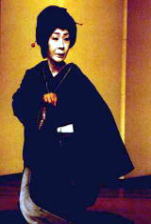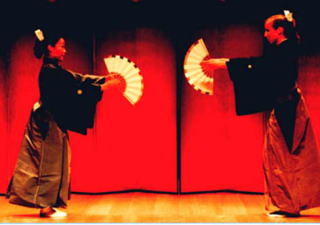-INTRODUCTION TO JAPANESE CULTURE-
| 乬Classical Japanese Dance乭丂 Date: March 2, 2001 丂18:30-20:00 |
| Place: Meguro Citizens乫 Center Hall |
| Sponsored by Meguro Board of Education and Managed by Meguro UNESCO Association |
| Performances | Dancers | Musicians |
| 丒丂KODAKARA SAMBASO |
Colleen Lanki |
|
| (Tokiwazu) | & Risa Suehiro | |
| 丒丂GUCHI (Jiuta) | Yuko Fujima | 丂Kazuko Saito |
| 丒TAMAYA (Kiyomoto) | Toshiomi Hanayagi | ShimadayuKiyomoto |
| Shizuzo Kiyomoto |
 Mark Oshima and Kahoru Matsushita, the performers introduced both in English
and Japanese, some of Japanese classical dances, differences in each and
their development into Kabuki. Before we saw them play, they explained
us the stories. Although even some Japanese had trouble understanding them,
a lot of people from other countries seemed to enjoy themselves.
Mark Oshima and Kahoru Matsushita, the performers introduced both in English
and Japanese, some of Japanese classical dances, differences in each and
their development into Kabuki. Before we saw them play, they explained
us the stories. Although even some Japanese had trouble understanding them,
a lot of people from other countries seemed to enjoy themselves.
(Above) GUCHI: This soundless dance added to the silence of the hall.
(Right) KODAKARA SAMBASO: Performance of Colleen from Canada and Risa Suehiro was very attractive丅
| Japanese classical dance, or nihon buyo consists mostly of dances that originally came from the kabuki theater and were intended to be performed by men, whether the roles were male or female.丂There is also a smaller repertory of dances called jiutamai, which are dances from the pleasure quarters of Osaka and Kyoto.丂Many jiutamai are very intense and romantic and were originally intended to be performed by women.丂The dances of kabuki are called odori and emphasize energetic walking and high stepping, while mai is a different style of movement with slow circling movements and the body kept close to the ground.丂Mai is closely related to the classical noh theater and the dances of noh are also called mai.丂In fact, the word buyo is a modern creation and was formed by combining the character for mai with the character for odori.丂With the modernization of Japan starting around 1868, these different styles came to be considered one art form and women could perform dances that were once only done by male actors |
I Am Headed for Nepal to Stay for Two Years
By Yasuo Hirata, Vice-President丂Meguro UNESCO Association
丂
丂I am going to Nepal to stay there for two years as an expert dispatched
by Japan International Cooperation Agency (JICA) to give what guidance
I can on the administration of agricultural cooperatives.丂As you many
know, JICA is a governmental organization authorized to provide developing
countries with the needed human resources in response to their varying
requests enabling us to contribute to their further development.丂Though
each of us who would like to serve as an expert in technical cooperation
is differently motivated, my stimulation derives from my commitment to
UNESCO乫s activities.
丂Upon good advice of Ms. Kato, President, and Mr. Okusawa, Vice-President,
I have joined the summer retreat programs several times and enjoyed witnessing
exchanges between Japanese and overseas students.丂I have also been impressed
with the many activities of our Association such as its study tours.丂My
involvement with the Association nurtured the idea in me that I might be
even happier if I had the opportunity to participate with the people of
a developing country and make use of my knowledge there.丂The recent reassignment
of personnel in the office in which I have been working for 6 years gave
me the chance to realize my idea.丂Though my decision may have come as
a surprise to the President and other officers of the Association, I do
hope that it did not inconvenience them too much.丂It is my sincere wish
that everyone will understand that my motive for making this change is
to realize in my own way the UNESCO spirit, which reads, 乬That since war
begin in the minds of men, it is in the minds of men that the defences
of peace must be constructed.乭丂
丂Nepal, which is known for her 乬world heritage,乭 suffers from less then
a 40 percent literacy rate and is in need of the 乬Terakoya Movement,乭
that is, a movement to open a small class room to teach children how to
read and write in a remote area where there is no established schools.
Accordingly, Nepal is the country on which I think UNESCO should put great
emphasis in their activities.丂While I am there, I will make a research
of the country from UNESCO乫s viewpoint to find the best way for UNESCO
to help them.
丂Two years later on my return, I hope to be able to give you an encouraging
report.丂I certainly would like to rejoin Meguro UNESCO Association and
in the meanwhile will do my work in Nepal always fondly remembering 乬my
association with the Association.乭丂I sincerely wish that we may continue
our information exchange during my stay.